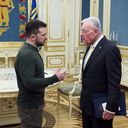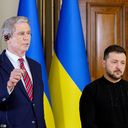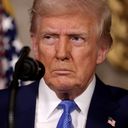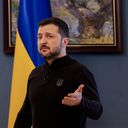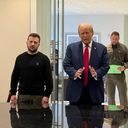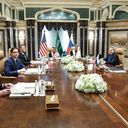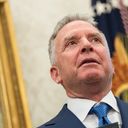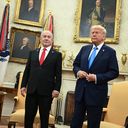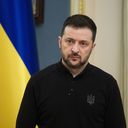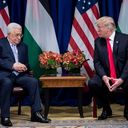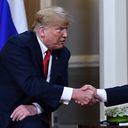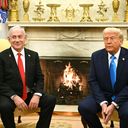Trump puts Ukraine in a vise
Three years after Russia invaded Ukraine, Washington is shifting its pressure from Moscow to Kyiv as the Trump administration tries to end the war.
Why it matters: President Trump's dramatic change in U.S. policy toward Russia shocked Ukrainian President Volodymyr Zelensky and is fueling fears among U.S. allies that the Trump administration will side with Moscow as it tries to negotiate an end to the conflict.
- At any other time in the past 80 years, it would have been unimaginable that the U.S. president would be pressing for a meeting with Russian President Vladimir Putin while calling Zelensky a dictator.
- Trump's approach stands in stark contrast to that of his predecessor former President Joe Biden who he claims was "played like a fiddle" by Zelensky and allowed the war to start and continue for so long.
Driving the news: Trump has been pressing Zelensky in recent days to sign an agreement that would give the U.S. and Ukraine equal shares of revenue from mining minerals and other natural resources in Ukraine.
- The agreement was Zelensky's idea and he raised it first with Trump in September.
- But while the Ukrainian president sees it as an economic partnership, Trump views the deal as a way to get back the hundreds of billions of dollars the U.S. gave Ukraine in assistance over the last three years.
- Trump said he expects the U.S. will receive $400 billion to $500 billion through the agreement.
"We are either going to sign a deal or there are going to be a lot of problems with them," Trump said in a speech on Friday.
- On Saturday, Trump said the parties were close to a deal. "We are asking for rare earth [elements] and oil — anything we can get ... we better be close to a deal," he said.
- A U.S. official involved in the negotiations confirmed a deal could be reached fairly soon. "The two sides continue to engage constructively in the process. Top officials on both sides are focused on getting this done," the official said.
Between the lines: The mineral deal isn't directly related to the negotiations to end the war but it has exacerbated tensions between the U.S. and Ukraine amid Trump's outreach to Russia about negotiations to end the conflict.
Catch up quick: Ending the war in Ukraine was one of Trump's key campaign promises.
- Since he assumed office, Trump began criticizing Ukraine and alienating NATO allies while warming up to Russia.
- After Trump spoke over the phone with Russian President Vladimir Putin earlier this month, senior U.S. and Russian officials met in Saudi Arabia in a significant breakthrough in frozen U.S.-Russia relations.
- The renewed engagement with Russia launched a diplomatic process to end the war, but its fast pace and initial focus on Moscow created anxiety in Ukraine and among U.S. allies in Europe.
As the U.S. began engaging with Putin, Trump cranked up pressure on Zelensky and began attacking him personally.
- Trump falsely claimed Ukraine started the war, called Zelensky a dictator and said he doesn't think it's important that the Ukrainian president be part of meetings between the U.S. and Russia about how to end the war.
The big picture: The U.S. position is also applying diplomatic pressure on Ukraine and its Western allies at the UN and in other international forums.
- The Trump administration is trying to push back on a UN General Assembly resolution presented by Ukraine marking three years for the Russian invasion.
- European diplomats say the U.S. is pushing numerous countries to not support the Ukrainian text, and instead get behind a U.S. text that doesn't refer to the Russian invasion and doesn't put any responsibility for the war on Russia. The U.S. draft resolution calls for ending the conflict between Ukraine and Russia.
- U.S. Secretary of State Marco Rubio in a statement on Saturday said supporting the "simple, historic resolution ... affirm[s] that this conflict is awful, that the UN can help end it, and that peace is possible."
What they're saying: White House press secretary Karoline Leavitt told reporters on Saturday evening that Trump "believes very strongly that Russia is willing to make a deal, and he's fighting to make a deal" to end the war.
- She said national security adviser Mike Waltz is going to "work around the clock" all weekend to get a deal.
- "The President [and] his team are very much focused on continuing negotiations with both sides of this war to end the conflict and the President is very confident we can get it done this week," she said.
What to watch: On Monday, the leaders of the G7 countries are expected to hold a virtual meeting marking three years since the Russian invasion. European diplomats said the U.S. currently opposes the draft statement for the meeting because it refers to Russia as "the aggressor."
- The U.S. is also planning to bring a draft resolution about the war in Ukraine to a vote at the UN Security Council on Monday, according to European diplomats who say the proposed text also doesn't hold Russia accountable for the invasion and only calls for ending the conflict.
- The diplomats said France and the UK will face a dilemma about whether to veto the U.S. resolution on the same day French President Emmanuel Macron meets Trump in the Oval Office and the same week that British Prime Minister Keir Starmer will visit the White House.




